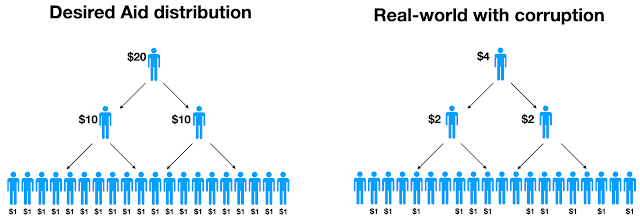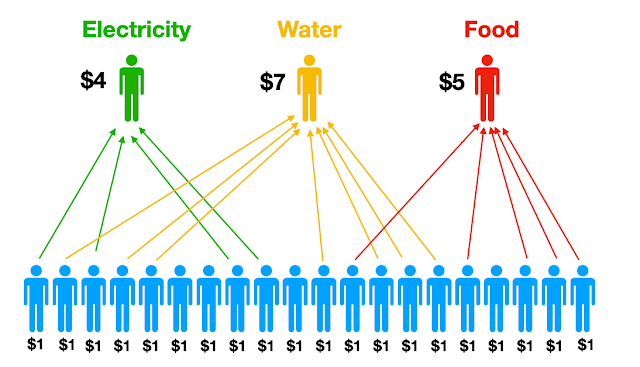In my post last week, I argued that if the COP 28 participants could agree on a number for the amount of funding required to tackle change, and agree to implement two modest new taxes that would have to be paid by everyone, our hopes of making progress would be vastly improved. And we could avoid the endless arguing about who should be paying.
The answer should be obvious. We should all be paying - in direct proportion to our ability to pay. That's a simple rule that I think we should all aspire to.
It is pointless trying to get elected governments to introduce big tax increases on their populations to pay for this. For obvious reasons, they will get voted out by the next Trump who will say "America First", "Cut Taxes" "Sod the planet".....
That's why my proposals for two new taxes - a 0.02% tax on all financial transactions, and/or a 0.3% annual tax on net wealth seem so sensible - at least to me! The critical thing is that they need to be paid by all parties - individuals, companies, trusts and governments, wherever they occur on the planet. No exceptions.
The funds would be sent directly to the United Nations Environment Program (UNEP) or some other global authority that can be trusted to do the right thing.
Last week, I took the number provided by Morgan Stanley in 2019. That report said that we would need to invest $50 trillion between then and 2050. I didn't question those numbers, but here is a brief summary of the breakdown. The money spent would be needed for five key areas five key areas of zero-carbon technology.
- Renewables will require $14 trillion of investment, and could deliver around 80% of global power by 2050—up from 37% today. As solar energy becomes more affordable, it will become the fastest-growing renewable technology.
- Electric vehicles will become more important than ever in the bid to reduce greenhouse gas emissions from automobiles; $11 trillion will be needed to build more factories and develop the batteries and infrastructure needed for a widespread switch to electric vehicles—the total number of which could grow to nearly 950 million by 2050.
- Carbon capture and storage, which Morgan Stanley says is the only viable option for reducing emissions from coal-fired plants, is another key area and would need almost $2.5 trillion of investment.
- Hydrogen can help provide clean fuel for power, cars and other industries—it will require almost $20 trillion of cumulative investments to help make the gas, increase capacity to power plants and manage its storage.
- Biofuels, like ethanol, will be key for future global transportation and eventually spread to aircraft and other forms of other travel—requiring $2.7 trillion by 2050.
But it is important to realise that those numbers do not include the cost of dealing with the damage that is already caused by Climate Change. What is the cost of failed crop harvests? What is the cost of the infrastructure needed to protect coastal areas from flooding? How can we help those who are most badly impacted by the climate change that we have already produced?
Do you think that you could just increase the funding for UNEP and hope that they would be able to work out where the money should go?
It's at this point that I would like to suggest that trying to solve problems using top down programs is unlikely to be the best solution.
As I have suggested previously, and as has been suggested by other groups including EqualRight.org, a particularly efficient way to help out those impacted by climate change is to provide them funds in the form of a Unconditional Basic Income. Rather than trying to pump money into third world countries top down, in the hope that their leaders will do the right thing, I think it would be much more efficient to pump the money into peoples pockets and let them decide what the priorities should be.
This was something I explained in a YouTube video I posted last year on "AI, Technological Unemployment and Universal Basic Income". Although that talk was aimed at showing how UBI could be useful for dealing with the unemployment generated by AI, many of the arguments I developed are directly relevant for using UBI to help tackle climate change.
For example, at one point in the video I discussed one of the fundamental problems of trying to distribute aid (money, bags of rice, tents...) to the population. This figure below compares what we would like - we give $20 to someone at the top of the pyramid, and hope that the aid will be distributed equally - with what actually happens in the real world. Because of corruption, people will be tempted to keep some of the aid for themselves, with the result that the process can be very inefficient.
Compare that distribution system with a UBI based system. The UNEP could set up digital bank accounts for all citizens and simply credit those accounts every month (for example). In such a system, the people themselves get to decide where the funds go. If people need energy, they could choose to buy electricity. If they are thirsty, they could buy water. And if people are hungry, they could choose to purchase food.
There would be no need for someone in an office in Geneva to decide what people should and should not be getting. The list of goods and services that could be funded in this way would be without limit. If they need medication, let them purchase medications. If they want renewable energy, let them club together to buy some solar panels. If they need to build walls to prevent rising sea levels from wiping out their homes, so be it.
It's interesting that this is really just allowing market forces to do their work. The problem is that the vast majority of people on our planet don't have any money to influence the markets. A global UBI would give those billions of people a voice.
I seriously believe that, with a global UBI in place, it may be much less complicated to tackle climate change that with the current attempts to find "top down" solutions. The Morgan Stanley report was arguing that we need to invest $14 trillion in renewable energy. If you say it like that, it sounds like a lot. And hoping that investors are going to invest $14 trillion (which effectively means borrowing the money) is probably naive. But suppose that you were paying all 8 billion people on the planet $30 a month of debt free money using funds generated by the 0.02% FTT and the 0.3% net wealth tax. It would cost about $3 trillion.
Anyone like to speculate what percentage of the $3 trillion would end up being used to tackle climate change? Clearly, the longer this goes on, the more urgent the need to tackle climate change will become, and the higher the percentage of the $3 trillion being used for that specific objective. Even if people use the money to buy food, water, and energy, it's still being used to offset the effects of climate disruption.
I firmly believe that the UBI mechanism is probably the best possible way to get people to change their life styles and give us a chance of combating climate change.


No comments:
Post a Comment